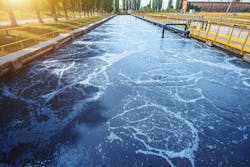Debunking common myths about industrial wastewater
There are many misconceptions out there about the world of industrial wastewater. These misconceptions can stop industrial facilities from utilizing the most effective and least costly treatment for their wastewater. This article serves to demystify this landscape and debunk some common myths around industrial wastewater treatment to help you maximize the potential of your wastewater.
Let’s dive into four common myths about industrial wastewater, and the real truths behind them.
Myth #1: Onsite wastewater treatment is expensive and not feasible for small facilities
The all-too-common misconception that onsite wastewater treatment is too costly and impractical for small-scale facilities often leads many businesses to not consider onsite treatment at all or to choose a treatment option that’s not well-suited for them. While it is true that traditional wastewater treatment systems can be expensive to install and maintain, advancements in technology have made onsite treatment much more accessible for small facilities.
In reality, there are now numerous cost-effective solutions tailored specifically for smaller facilities. From compact, packaged systems to innovative biological and chemical processes, the options available today are more accessible and efficient than ever before. These solutions can not only meet regulatory requirements but also offer long-term savings by reducing water consumption, minimizing disposal costs and even recovering resources for reuse within the facility.
Small facilities do not need to redesign their plant to install an onsite wastewater treatment system or make a large capital expenditure investment. With containerized solutions and service models, onsite treatment systems are very much within reach, regardless of wastewater volumes generated or space and time limitations.
Check out this article to help determine whether onsite wastewater treatment is the right solution for your facility.
Myth #2: Wastewater treatment is only about compliance
Utilizing wastewater treatment solely for the purpose of meeting regulatory standards and avoiding penalties can be a costly misconception. Focusing solely on compliance for your wastewater treatment can actually lead to inefficient systems and expose your facility to greater business risks. While regulatory compliance is a crucial aspect of wastewater treatment, it serves merely as a baseline for your treatment efforts, as this water source can offer multi-level benefits for your facility.
Companies that view wastewater treatment as an opportunity rather than a burden recognize its potential to enhance sustainability, mitigate risks and create value throughout their operations. Going beyond compliance allows you to mitigate inefficiencies in your system to reduce energy, emissions and costs, and open the opportunity to recover valuable resources from an otherwise wasted byproduct.
Read this article to learn more about why simply achieving compliance isn’t enough when it comes to wastewater and how you can improve your wastewater management to go beyond compliance.
Myth #3: Industrial wastewater is too complex to treat
Industrial wastewater is amongst the most contaminated wastewater generated globally, containing an array of pollutants such as heavy metals, high salts, complex chemicals and/or high levels of organic compounds, which contribute to wastewater treatment challenges. Historically, it was indeed too costly and difficult to treat industrial effluents efficiently, often requiring dilution or alternative methods such as land application or incineration. However, thanks to technological advancements, this is no longer the case.
Modern wastewater treatment technologies are now designed to handle a wide range of contaminants, no matter how complex they may be. Techniques such as advanced oxidation processes, low-energy membrane filtration and bioelectrochemical treatment enable industrial facilities to achieve regulatory compliance with their wastewater through more sustainable methods.
Whether in the food and beverage industry, pharmaceutical manufacturing or chemical and petrochemical processing, there are custom wastewater treatment solutions that address the unique challenges of each industry’s wastewater.
This industrial wastewater treatment article explores the available treatment methods for industrial wastewater, and can help you determine the best approach for your facility.
Myth #4: Wastewater treatment does not impact business bottom line
Perhaps the most costly myth to believe is that wastewater doesn’t impact your bottom line. The reality is quite the opposite. Wastewater has a direct influence on your bottom line, and neglecting this fact can lead to negative consequences and money left on the table.
Improper management of wastewater can result in hefty fines, legal liabilities and damage to reputation, all of which can have serious financial implications. Additionally, untreated or poorly treated wastewater poses risks to public health and the environment, potentially resulting in cleanup expenses or compensation claims in the event of contamination incidents, further harming your reputation.
However, effective wastewater management can bring numerous financial benefits to businesses. By reducing water consumption, optimizing resource utilization and minimizing disposal costs, companies can achieve significant savings on operational expenses. Embracing sustainable wastewater management practices can also enhance brand reputation, attract environmentally conscious customers and create opportunities for market differentiation and competitive advantage.
Read our article on wastewater and your bottom line to discover how you can utilize wastewater to improve your financial performance and mitigate the negative financial risks it can pose.
Clearing the waters of industry
Aquacycl aims to demystify the world of industrial wastewater by providing a knowledge hub to help you make informed decisions on your facility’s wastewater management. Through a suite of accessible resources, from videos to blogs to whitepapers, we aim to educate and empower stakeholders across industries. Explore our resource library to dive deeper into industrial wastewater.
